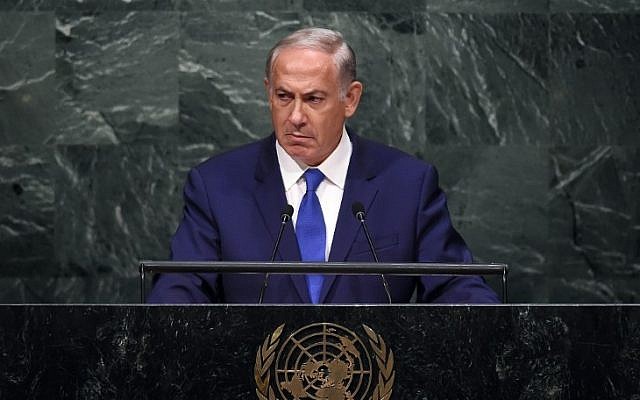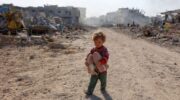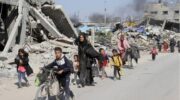Prime Minister Benjamin Netanyahu stares silently at the audience for 44 seconds during an address to the 70th Session of the United Nations General Assembly at the UN in New York on October 1, 2015.
The United Nations has passed an inordinate number of resolutions critical of Israel (at least seven hundred), but very few critical of Palestine. Is there a good reason for this high number, or is this a case of anti-Israel bias? – or worse yet, anti-Semitism? This analysis breaks it down.
by Kathryn Shihadah
The UN Digital Library is an amazing resource for international relations nerds. It contains over 1 million documents – speeches, meeting minutes, letters, reports, and more in 6 languages.
It’s possible to view every one of the 63 speeches made by Israeli Ambassador Danny Danon between the start of his assignment in October 2015, and its end just last month. (For example, go here to read his speech claiming the Bible as proof that historic Palestine is actually owned by the Jewish people.)
The UN Digital Library contains voting records on all proposed resolutions – which show that often the United States and Israel stand nearly alone against the world in justifying Israeli violence against Palestinians (example).
It’s possible to discover how many reports have been circulated, speeches have been given, and meetings have been held about Palestine (over 28,000 – of which more than 300 occurred in 1947, before the creation of Israel).
Could there really be that much to say about a tiny sliver of land no bigger than Vermont? And might it suggest an anti-Israel sentiment pervading the UN?
Apparently there is that much to say. “The Question of Palestine” has been an ongoing topic in the United Nations General Assembly (UNGA) since 1947. But does that indicate a sinister motive? A survey of UN resolutions may provide an answer.

Early injustices and rebukes
In November 1947, the United Nations General Assembly (influenced by bribes and threats from Israel partisans) recommended a partition plan (see map) in which Palestine would be partitioned into two entities: a Jewish State and an Arab State (Jerusalem would be an international city). Although the Jewish population was only 30 percent, owned under 7 percent of the land, and was largely composed of recently arrived colonists, the proposed Jewish state was given approximately 55 percent of the area.
This resulted in an escalation of the violence that had begun in the 1920s between members of the indigenous Palestinian population and Zionist arrivals. In the ensuing months, Zionist forces – larger in number and better armed than the Palestinians – committed 16 massacres and expelled 413,000 Palestinians.
On midnight of May 14, 1948, Zionists declared the establishment of the Jewish state, which they decided to name Israel (they also considered other names, including “Tzabar” (sabra) and “Zion” and “Judah.”*) The surrounding Arab countries then joined the conflict on the side of the Palestinians, but the number of the combined combatants still remained less than the Israeli forces.
By the time a truce was finally reached, 750,000 Palestinians (one researcher says 900,000) were in exile, and Israel controlled 78% of historic Palestine. Israel has never declared its borders and has steadily confiscated more and more Palestinian land. Many Palestinian refugees ended up in the tiny Gaza Strip; others found themselves in Jordan, Lebanon, or Syria.
International law requires that refugees be allowed to return home after hostilities, but Israel balked. So, in December 1948, the UN Security Council passed Resolution 194, stating among other things its aspiration
…that the [Palestinian] refugees wishing to return to their homes and live at peace with their neighbors should be permitted to do so at the earliest practicable date, and that compensation should be paid for the property of those choosing not to return and for loss of or damage to property…
Israel did not comply with the resolution.
The will of the UN has remained the same: every year since 1948, the body revisits Resolution 194, grieves over the continuing injustice, and creates another resolution demanding satisfaction – hoping it will be the last.
Help for Palestinian refugees
In 1949, the United Nations created the UN Relief and Works Agency for Palestine Refugees (UNRWA) with a one-year mandate to assist Palestinian refugees with education, health care, social services. The UN expected that the refugees would be home by 1950.
Israel did not comply.
Every year since 1949, diplomats have listened to experts, read reports, attended meetings, made plans, and passed resolutions to ensure the continuation of UNRWA’s work for the millions of Palestinians still living in refugee camps – these resolutions in addition to those calling for their right of return.
Occupation, more refugees
In 1967, during the course of a war against Egypt, Jordan, and Syria, Israel occupied the last 22% of mandatory Palestine, including the territories of the West Bank and the Gaza Strip.
The UN Security Council passed Resolution 242, which reminded Israel of the international principle of “the inadmissibility of the acquisition of territory by war,” and declared that Israel must withdraw from the Palestinian territories.
Israel did not comply.

During the 1967 war, hundreds of thousands of Palestinians were displaced – many of whom had been displaced once before in the 1940s. (At this point, nearly half of all Palestinians lived in exile.)
The United Nations’ list of demands now included an end to occupation, as well as the right of return for refugees from both 1948 and 1967.
Settlements and Jerusalem
Immediately after the 1967 war, Israel began an illegal policy of transferring a portion of its Jewish population to live in “settlements” inside the occupied Palestinian territories.
Again, the United Nations stepped in to demand Israel’s compliance with international law, and has passed resolutions denouncing settlements ever since. These condemn the settlements’ theft of water and other natural resources, harassment and violence on the part of Israeli settlers, economic struggles and living conditions Palestinians experience due to the settlement growth – and more.
Israel has not complied with any of these resolutions (well over 600,000 Israeli settlers live illegally on Palestinian land today).
During the 1967 war, Israel also occupied East Jerusalem, where Palestinians hoped to locate their capital someday. A few years later, Israel annexed the region – this action was contrary not only to international law, but also to UN intentions that Jerusalem be preserved as an international city – and Israel’s own promise to follow that plan.
Year after year, the General Assembly has passed resolutions pressuring Israel to do right by Jerusalem – in addition to resolutions about the right of return, refugees’ needs, occupation, and settlements.
Israel has yet to comply.
Israeli nukes and South Africa
In 1952, the United Nations took notice of the apartheid regime of South Africa.
Beginning in 1963, the UN Security Council called on member states to follow the directive of the UN Charter and stop selling military articles to South Africa.
By 1974, resolutions began calling out Israel by name for refusing to comply. (France, the UK, and the US were also named for using their Security Council veto to “[prevent] the Council from taking effective action” against South Africa). Israel’s refusal – and the resolutions – continued until the end of apartheid.

Also in 1974, building on efforts by the Council of the League of Arab States, the United Nations began advocating for a nuclear weapon-free Middle East. Israel was known to be “secretly” developing nuclear weapons, and would not sign the Non-Proliferation Treaty. UN resolutions called on Israel to comply.
46 years (and 46 resolutions) later, Israel still has not complied.
In 1978, the UN called out Israel’s use of cluster bombs against Lebanon, its nuclear collaboration with South Africa, and other alarming activities, and requested member states to refuse to give or sell Israel military equipment.
In this case, it is the United States that has not complied: USAID indicates that Israel has received over $199.8 billion in aid from the US since 1978 – the vast majority in military aid spent in purchasing US-made weapons. Israel has continued to use banned weapons (the US also has cluster bombs ready for use).
Uprising and wall
In late 1987, after twenty years of occupation with no end in sight, Palestinians initiated an uprising, or intifada. It was primarily a nonviolent movement, but was met with overwhelming Israeli suppression.
About 1,400 Palestinians and 180 Israelis were killed in the six-year uprising. Over 175,000 Palestinians were arrested and 2,000 homes were punitively demolished. Adding to the savagery, then-defense minister Yitzhak Rabin ordered Israeli soldiers to “break the bones” of Palestinians.
During the intifada, the United Nations called on Israel to stop its policies of brutality, and continued its calls to end the occupation, dismantle the settlements, allow refugees to return home, end its collaboration with South Africa, and sign the Nuclear Non-Proliferation Treaty.
Israel did not comply.
In 2002, Israel began constructing a barrier (often called “Apartheid Wall”) to separate Israel from the West Bank. The wall cuts deep into Palestinian territory and prevents Palestinians from traveling freely, reaching their farms, jobs, and schools, visiting their families, and getting medical care.
In 2004, the International Court of Justice (ICJ) declared the wall “contrary to international law,” and demanded that Israel “cease forthwith” the construction, return the land to its owners, and compensate those whose interests had been harmed. The UNGA subsequently passed a resolution, conveying the ICJ findings and demands.
Israel has not complied, but has rather continued to build the wall.
The ICJ also asserted that all states are obligated “not to recognize the illegal situation resulting from the construction of the wall and not to render aid or assistance in maintaining the situation created by such construction.”
The United States – which tacitly accepts the wall with all its implications – has not complied.
Conclusion
This sample of United Nations resolutions demonstrates the UN’s objective, not to bash a country because of its ethnic makeup, but to right the wrongs perpetrated against Palestinians. At times the UN has wavered, giving in to certain “powerful Member States.”
Unfortunately, Israel has been steadfast, and can therefore expect global criticism to continue.
Israel would do well, if it wishes to escape criticism, to follow in the footsteps of its erstwhile crony, South Africa. When that nation dismantled and repented of apartheid, it was welcomed back into the global community with open arms.
As long as Israel refuses to make amends toward the Palestinian people, the reprimands will continue – not because the UN is anti-Israel, but because Israel is anti-justice.
…On May 14, 1948, a couple of days before the British rule over Palestine ended, the Jewish leadership in Palestine met in Tel Aviv. Presided over by David Ben-Gurion, who would become Israel’s first prime minister, the small group decided that a Jewish state would be declared independent on the day the British left.
Then the small band turned to discussing what to name the state.
According to the only source extant for the proceedings, an article by Palestine Post writer Moshe Brilliant, published a year later, at first the group wanted to go with the name Judah, the name of the ancient Jewish Kingdom. But this name was rejected, after some discussion, since most of historic Judah fell outside the borders of the nascent state according to the United Nations Partition Plan for Palestine that was on the table at the time.
The group turned to other possible names – among them “Zion” and “Tzabar” (sabra) – but then someone suggested “Israel” and a vote was held. The name “Israel” won by 7 to 3.
As for who suggested the name, Brilliant says that it was Ben-Gurion himself. It is possible however that as he wrote a year after the event, he got this detail wrong. Moshe Sharett, Israel’s second prime minister, had been calling the future Jewish State “The State of Israel” in speeches at least since 1946, while Ben-Gurion was using “Medinat HaYehudim” (“The State of the Jews”), so it seems plausible that it was Sharett, not Ben-Gurion. (In an interview in 1965, Ben-Gurion was asked who suggested the name, and replied he didn’t remember).
Anyway, neither Ben-Gurion nor Sharett were first to call the nation “State of Israel” (“Medinat Yisrael”). That honor belongs to a rather obscure Jewish Galician writer named Isaac Pernhoff, who in response to Herzl’s utopian outline of the Jewish state “Altneuland,” published his own alternative view under the title “Shney Dimyonot” (“Two imaginings”). In this short 1896 article, Pernhoff predicted that the Jewish state in Palestine would be called “Medinat Yisrael” – the State of Israel. And so it was.
Also see this.
Kathryn Shihadah is staff writer for If Americans Knew. She also writes for MintPress News and blogs at Palestine Home.
Our operations are funded solely by generous individuals like you. Your contribution will help us continue shining a light on the Israel/Palestine situation and the U.S. connection.
DONATERELATED READING:
Has Israel Effectively Colonized the United States?
Experts: Israeli System Constitutes Apartheid, Crime against Humanity
Ten ordinary days under occupation in Palestine
Israel has arrested over 50 thousand children since 1967
Israel’s collective punishment of Palestinians illegal and an affront to justice: UN expert
Against Our Better Judgment: The hidden history of how the U.S. was used to create Israel





